Focus Areas
Nepal is currently rapidly urbanising, with its booming secondary cities playing a vital role for regional economy and services. Yet, due to the recent and rapid urbanisation, these cities often lack urban planning tools and methods to assert the local population’s needs and climate-resilient infrastructures.
The project targets six secondary cities in Nepal: Birendranagar, Chandragiri, Dhangadhi, Lamkichuha, Sunwal, and Tansen. Working in public open spaces, it will reach over 594,900 beneficiaries.
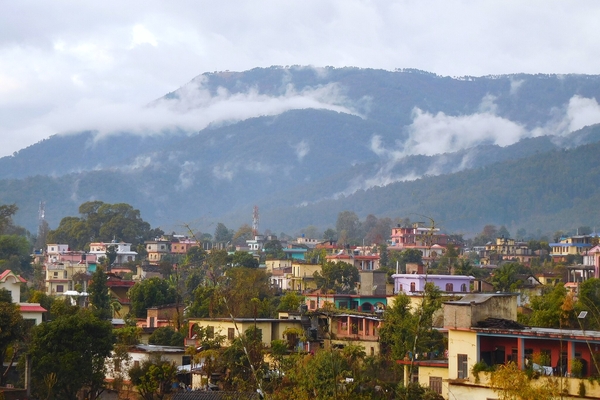
Birendranagar Municipality is the capital city of Karnali Province, with a total population of 153,863 (78,734 women and 75,129 men).
Birendranagar has a domestic airport and serves as the main food supplier for rural Karnali Province and a shopping hub for nearby districts.
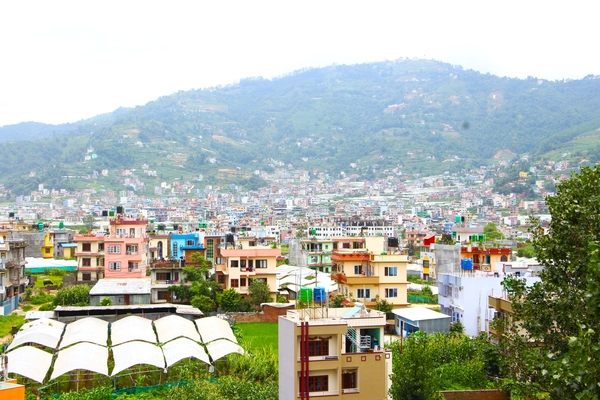
Situated in the southwest part of Kathmandu Valley in Bagmati Province, Chandragiri Municipality covers a total area of 43.92 km2. Its population is 136,860, with more females (50.09%) than males.
Chandragiri has a rich religious, cultural, and historic heritage and is located along the Prithvi Highway, a crucial entry point to the Kathmandu Valley.
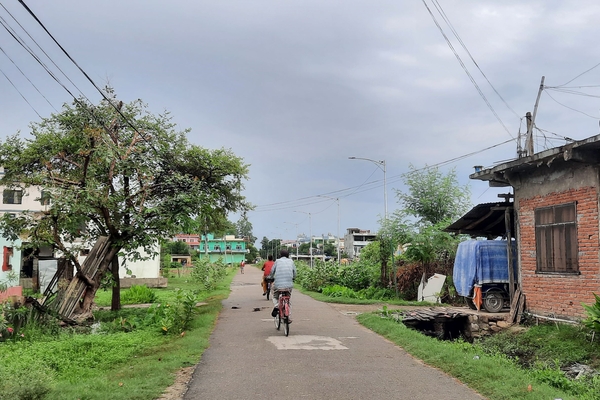
Dhangadhi Sub-Metropolitan City is a major city in the Kailali District of Sudur Paschim Province in southern Nepal. It is the province's most densely populated city, with a total population of 198,792 as of the 2021 census. Dhangadhi has more women (101,384) than men (97,408).
The city lies along the land route from India and is a gateway to popular tourist destinations.
Lamkichuha Municipality is located in Kailali District in Sudurpashchim Province. It lies 72 km east of Dhangadhi and 590 km west of Kathmandu.
Lamkichuha is a major commercial centre in Kailali District and destination for migrants from the surrounding rural areas.

Located in southern Nepal, Sunwal Municipality has a total population of 72,085 (53% male and 47% female) and covers 139.1 km.2 It is the most populous city in Parasi District.
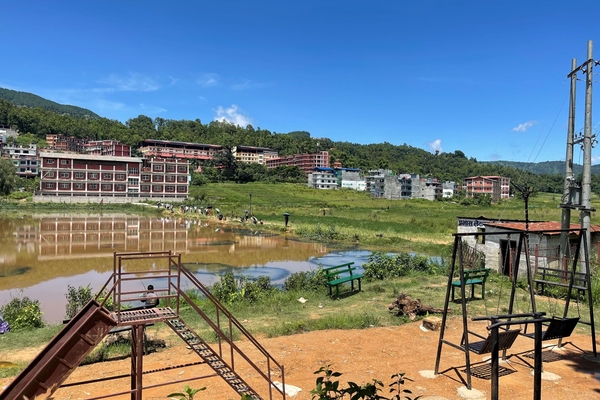
One of the oldest municipalities in Nepal, Tansen is the administrative centre of Palpa District in Lumbini Province in western Nepal. It has a total population of 50,792 (27,378 women and 23,414 men).
Approach
To support municipalities in addressing these challenges, the Cities 4 Women project aims to:
1. Develop a gender-sensitive framework for the National Urban Development Strategy.
The project engages national and local stakeholders to review existing policies, tools, and guidelines in order to create a gender-responsive, climate-resilient framework and urban planning guidelines.
2. Promote women’s leadership and participation in decision-making at the local level.
Through technical assistance to municipalities, the project uses Cities Alliance’s participatory tools to co-design spatial interventions with the local population. The process takes into account both gender and climate considerations to develop guidelines for gender-sensitive and climate-resilient urban design. Feasibility studies for medium-scale projects are included in the municipal investment planning process.
3. Pilot spatial and participatory interventions focusing on gender and climate resilience.
Implementing small-scale inclusive and participatory spatial projects, the project prepares packages for medium-scale initiatives to make them investment-ready with the establishment of co-funding mechanisms through the Challenge Fund managed by UNOPS.
4. Exchange knowledge on participatory processes, gender, and climate-related initiatives.
The dissemination of knowledge and materials is a key component of the project, with national and international city-to-city exchanges for peer learning opportunities to inspire regional initiatives.
To that end, the project includes organising architectural design competitions for projects identified in the Municipal Annual Plan. It also provides small grants to Masters and PhD students in urban planning and/or design in the field of gender mainstreaming and climate adaptation focusing on urban spaces.
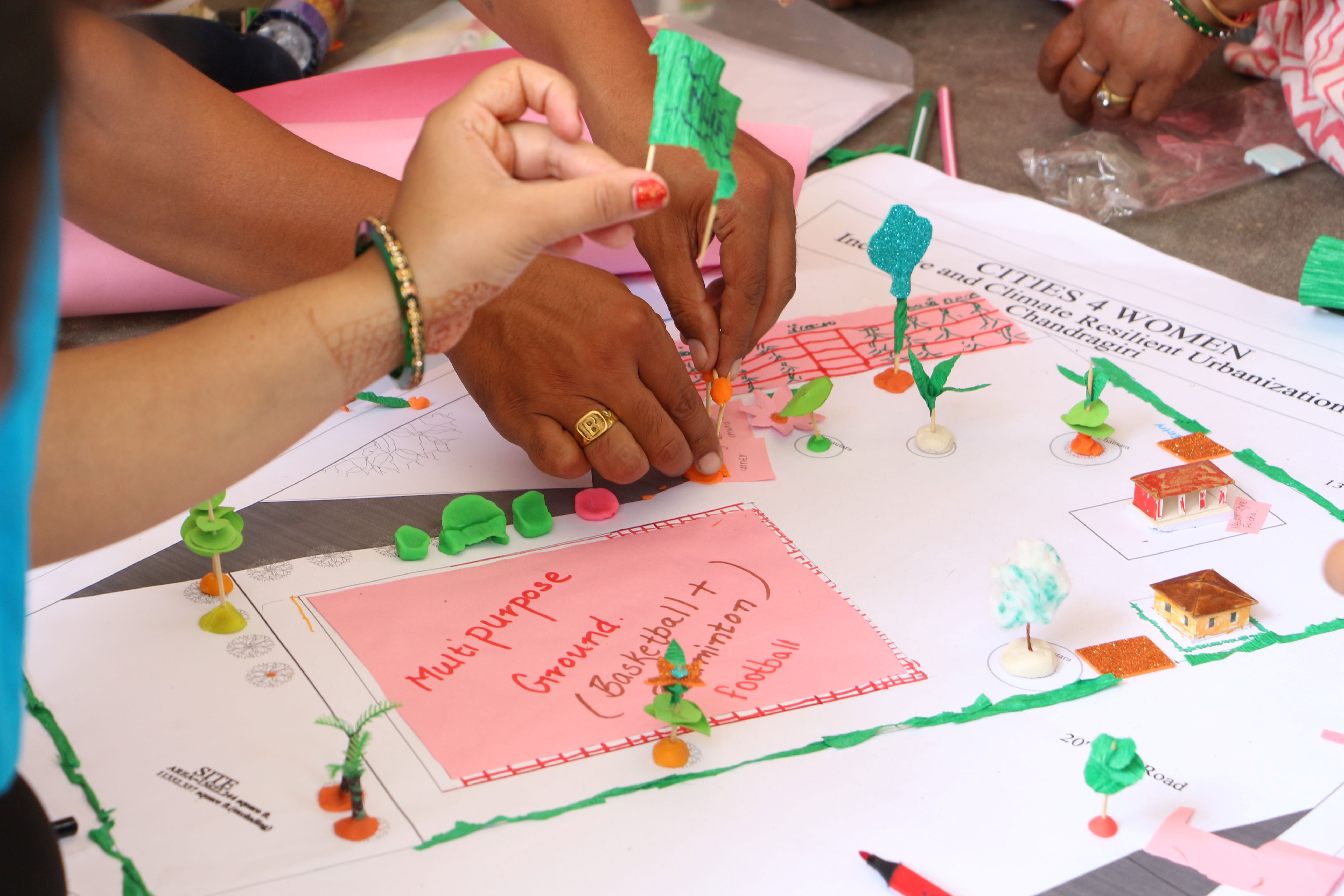
Activities
Some of the programme's activities have already been completed, while others are underway.
The Cities 4 Women project organised a participatory gap assessment of Nepal’s Seven-Step Planning Process for local governments and municipal plans from a gender and climate-sensitive perspective. The team conducted the assessment through focus group discussions, key informant interviews, and surveys via the data collection platform Tathyanka.
Two of Cities Alliance’s globally tested tools, Her 4 Climate and Urban Assessment Framework: Through a Gender Lens, were adapted to the Nepalese context to undertake the assessment.
Municipal representatives from the ward level participated in the community-level data collection process to assess safety and gender inequality, identify and prioritise public open spaces, and consider climate initiatives in municipalities.
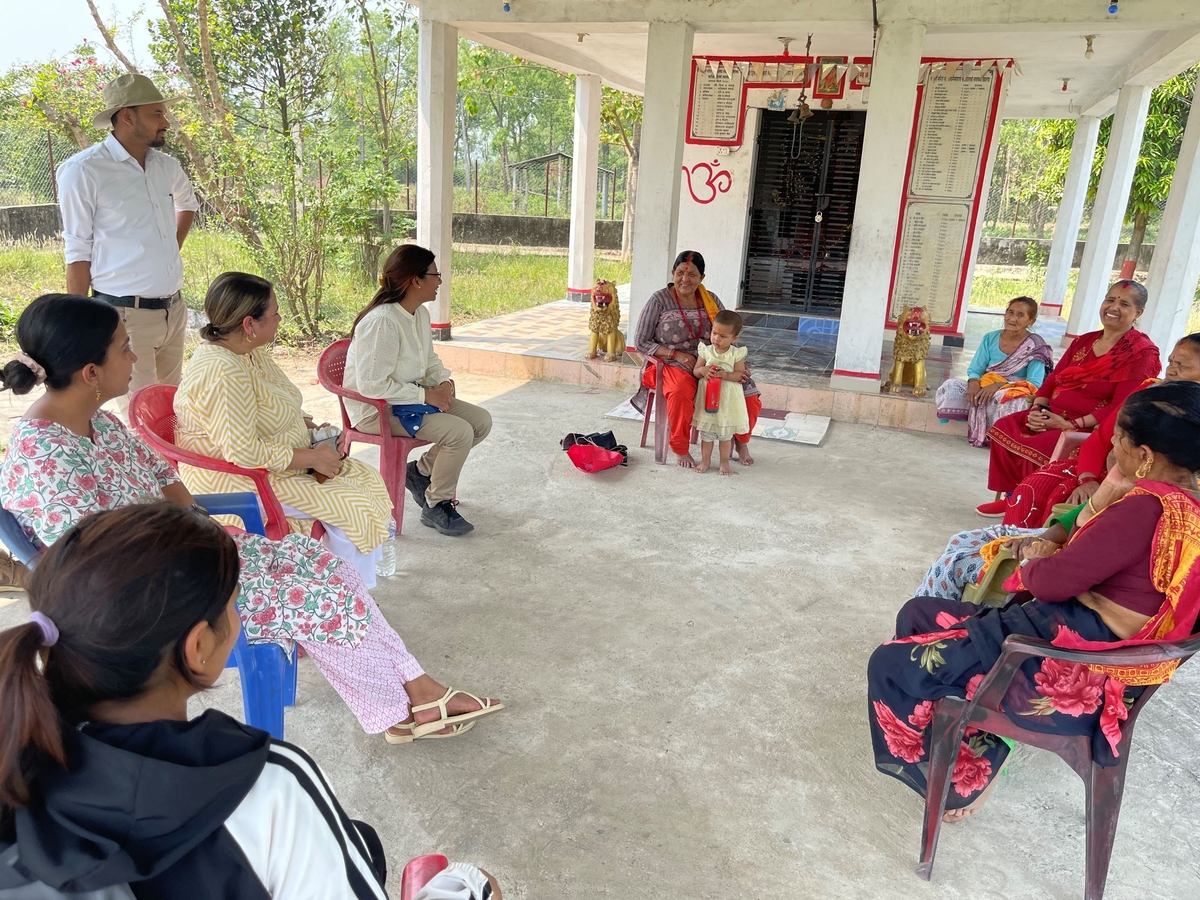
The project conducted gender-based community mapping in each municipality to explore the experiences and perceptions of a diverse perspectives of citizens, particularly women and marginalised communities, in how they use public open spaces.
The Cities Alliance tool Urban Assessment Framework Through a Gender Lens was adapted to conduct the mapping exercises.
The exercises found that women – especially migrants, older women, adolescent girls, and women with disabilities – find public open spaces to be limited, inaccessible, and unsafe at night, which contributes to a fear of harassment and violence. Women in both urban and rural wards expressed concerns over safety in public open spaces due to poor security, lack of proper lighting, poor signage, and inadequate inclusive design.
When community members participate in designing these spaces, they tend to foster safety, ease of movement, and a sense of connection.
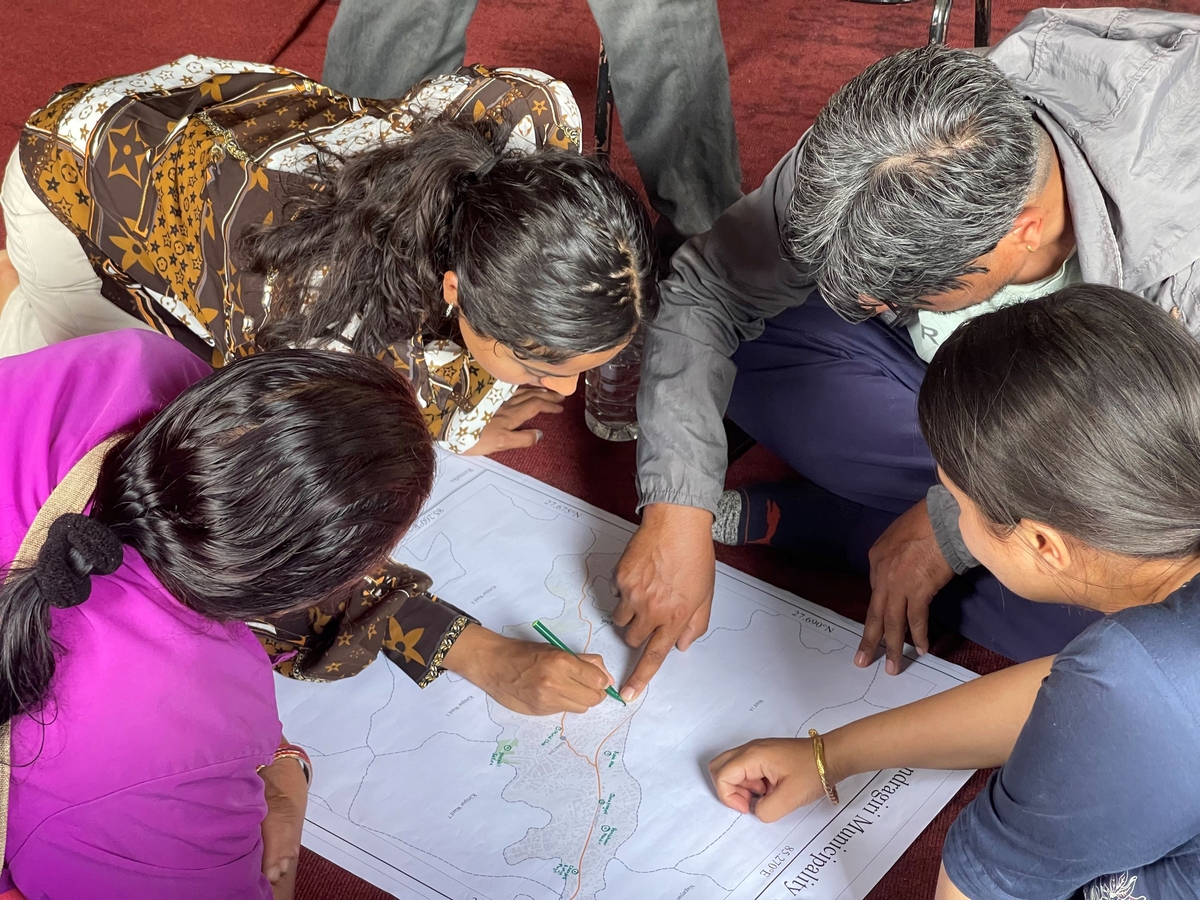
Mayors of each municipality conducted workshops on inclusive planning to embed inclusivity and climate resilience in the annual local planning process. These workshops targeted executive committee members, officials, and community members of the municipalities.
The project team highlighted the importance of an inclusive planning process in the local government that engages marginalised populations and gender-sensitive budgeting. The workshops provided a much-needed forum for discussing issues, challenges, and opportunities related to participatory and inclusive planning. It gave the participants a chance to identify community needs which ward representatives could then submit to the municipality for review and approval.
A key message emerging from the workshops was that municipalities must prioritise inclusive planning processes for the effective and efficient implementation of municipal activities, particularly in the design and development of physical infrastructure.
In addition, there is a pressing need for municipal capacity building in areas such as Gender Equality and Social Inclusion (GESI), Protection Against Sexual Exploitation, Abuse, and Harassment (PSEA), and gender- and climate-sensitive planning and budgeting. Ward-level representatives should also receive further training and sensitisation on inclusive planning processes to better address the voices of marginalised populations.
“The flow of information from municipality to ward level and then ward level to those marginalised populations is obstructed due to communication barriers which are still prevalent in the community. So, to make inclusive planning, we have to provide the right information about the preliminary discussion on the planning process to ensure the voice of those marginalised communities. Besides, even if they participate in the cluster level planning process, then they act as an observer because their voices are always suppressed by others.” – Sanu Kanchha Pariyar, Municipal Executive Committee, Chandragiri
“The ones who have access to political parties get opportunities to participate in annual planning meetings and prioritisation phases but not all.” – Ms. Manju Bishwakarma, Municipal Executive Member, Tansen
“The Cities 4 Women Project was formulated through rigorous consultation with the municipality. I am very pleased with the project's performance and am hopeful that it will help create a gender-inclusive and climate-resilient Birendranagar.” – Ms. Mohan Maya Dhakal, Mayor of Birendranagar

The project conducted a Capacity Assessment for the Prevention of Sexual Exploitation, Abuse, and Harassment in the five municipalities to assess their capacity to prevent and respond to sexual exploitation, abuse, and harassment.
The results revealed limited understanding among elected representatives and municipal officials of the issue, despite federal legislation and gender equality training. There is a pressing need for municipal capacity building in this area.
In Dhangadhi, the project organised an orientation for municipal leadership on protection from sexual exploitation and abuse to build the capacity of local level government representatives and staff on these issues. The positive feedback from the orientation highlights the significance of such activities in fostering a safer, dignified, and respectful workplace.
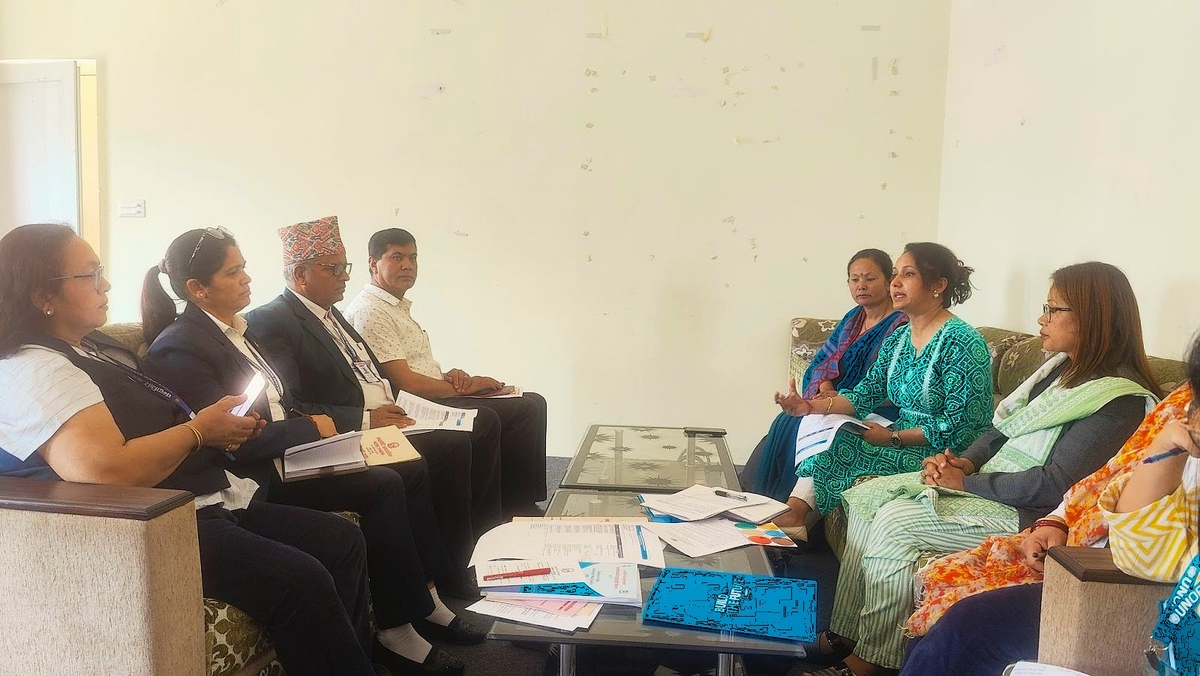
With knowledge exchange as an important component of the project, it supported mayors and deputy mayors of four municipalities to attend the Commonwealth Local Government Forum (CLGF) Women in Local Government Network South Asia regional meeting from 25-27 June 2024 in Colombo, Sri Lanka.
The meeting reviewed and ratified a Charter for Gender Equality for local governments in South Asia and provided the opportunity to exchange on regional challenges and priorities issues of women in local government in Asia. The meeting aimed to reinforce social resilience through women’s political representation in local government.
The mayors visited public open spaces in Colombo, such as Viharamahadevi Park and Galle Face Green Park, to observe how they were created from an inclusivity perspective. The Nepalese delegation learned about the design and maintenance of inclusive public open spaces, and they observed how these parks contribute to community well-being and promote cultural value. The mayors and deputy mayors expressed a strong interest in replicating similar models in their municipalities in Nepal to build inclusive public open spaces.
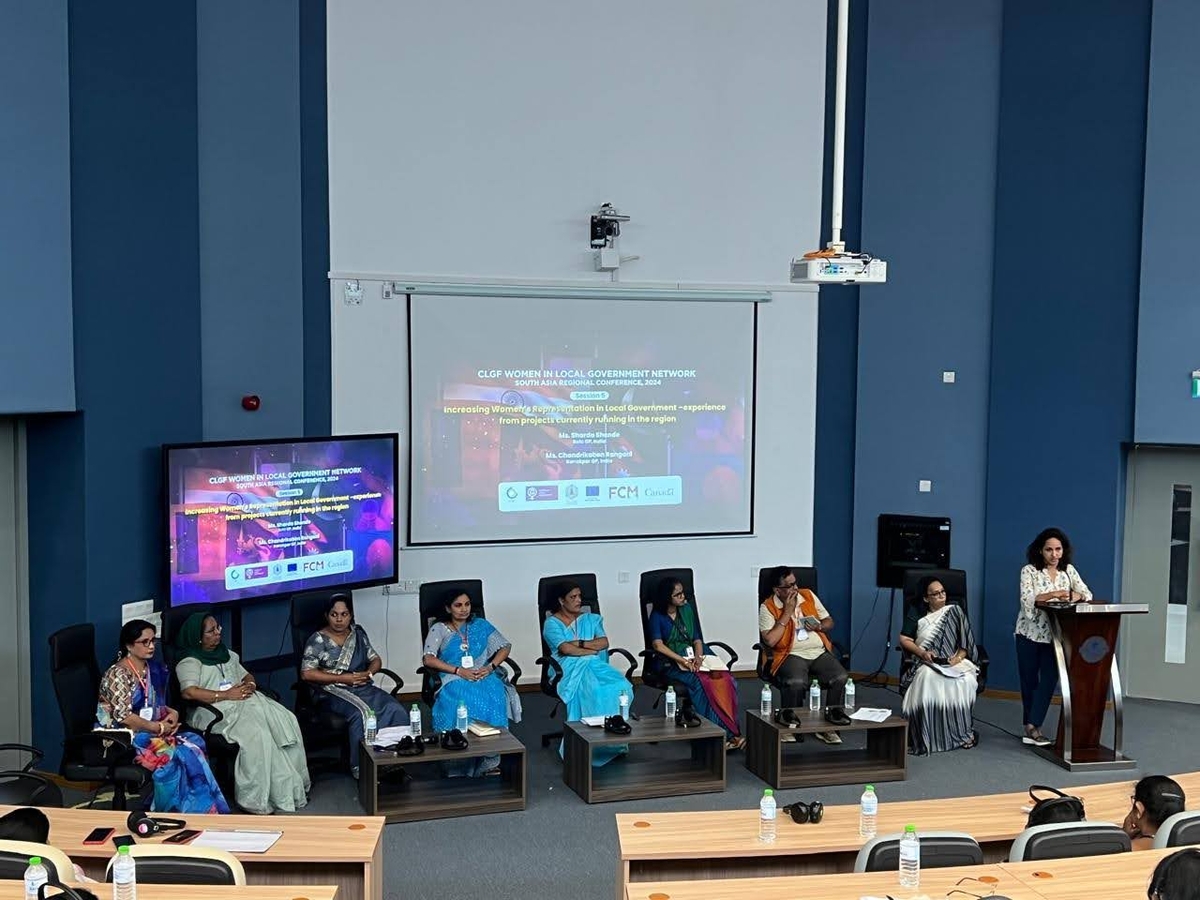
Building on the results of the GAP assessment and community mapping, the project partners organised ten co-design workshops – two in each of the five municipalities – for mayors, deputy mayors, Chief Administrative Officers, municipal staff, ward representatives, and community members (with an emphasis on women, youth, children, and senior citizens).
The workshops facilitated a participatory and user-centered approach to designing community projects in a way that integrated environmental aspects. Involving stakeholders in the initial phases of the design process increases ownership and accountability of the design and, later, the implemented project. It also helps secure buy-in from the municipality and enables municipal officials to better understand the site and vision for the projects.
“During the entire co-designing phase, I felt more like designing my own home and compounds.” – Surya Kumari Shrestha, Senior Citizen, Dhangadhi sub-metropolitan city-1.
“I was a child, now I am an adult and later on I will be in the group of senior citizens, so I personally encourage everyone to co-designed park that will be accessible and feasible to all the age group. Not only this, after the final design is done, based on this co-design we will again consult with community people before going for construction because it supports community accountability and ownership. Besides, from today we have started a campaign to make it happen successfully.” – Tikaram Sharma, ward chairperson, Birendranagar municipality-8.
“On my weekend, I usually take my grandparents to the market areas so while they walk around the space I felt the importance of creating inclusive spaces where those senior citizens can walk and rest as per their need.” – Kundan Thapa, youth, Tansen municipality ward 4.

The project worked with the Department of Architecture from the Tribhuvan University Institute of Engineering, Pulchowk Campus, to organize an urban design studio in Chandragiri Municipality from 21 July to 6 August 2024.
The studio brought together students in the fields of architecture, urban planning, urban design, and energy efficient building to learn about participatory and inclusive design and climate-sensitive initiatives. It introduced the students to the concepts of participatory and climate-responsive urban design and enhanced their participatory design, conceptualisation and visualis
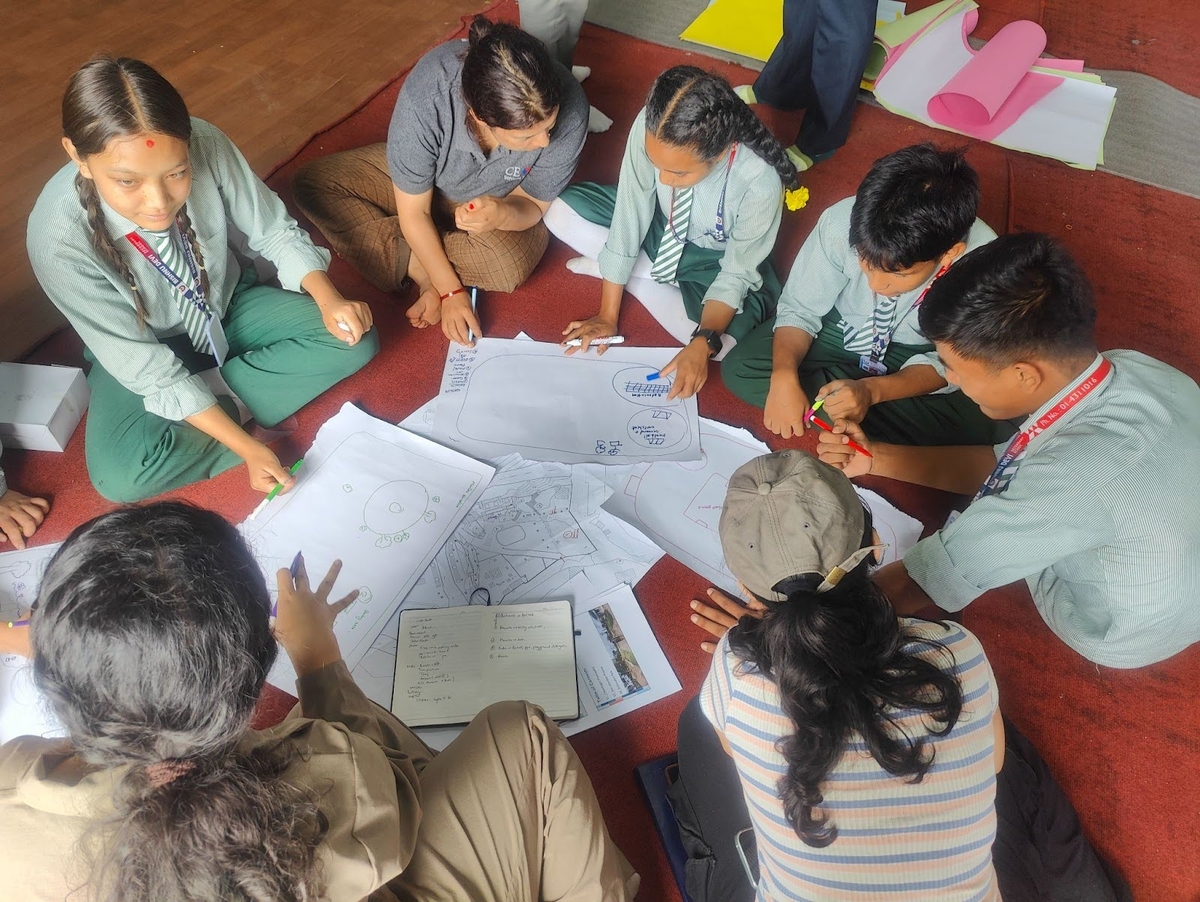
ation skills. It also served as a learning platform for the project participants, communities, academia, federal, and local government.
The project launched an international urban design competition on 1 August 2024. It aims to solicit high-quality, innovative designs that offer a range of approaches for creating inclusive and climate-resilient public open spaces in Nepal’s municipalities.
The competition supports municipalities by providing creative design solutions that are functional and inclusive, economically viable, ecologically sound, and sustainable. The call was open to architects, urban planners, designers, practitioners, and students.
The five sites included in the competition are the Kailali River Corridor in Dhangadhi, Greater Ghantaghar Park in Birendranagar, Kanchanbasti Aarogya Udhyan Park in Chandragiri, Shomnath Haatbazar in Sunwal, and Kudapani Park in Tansen.
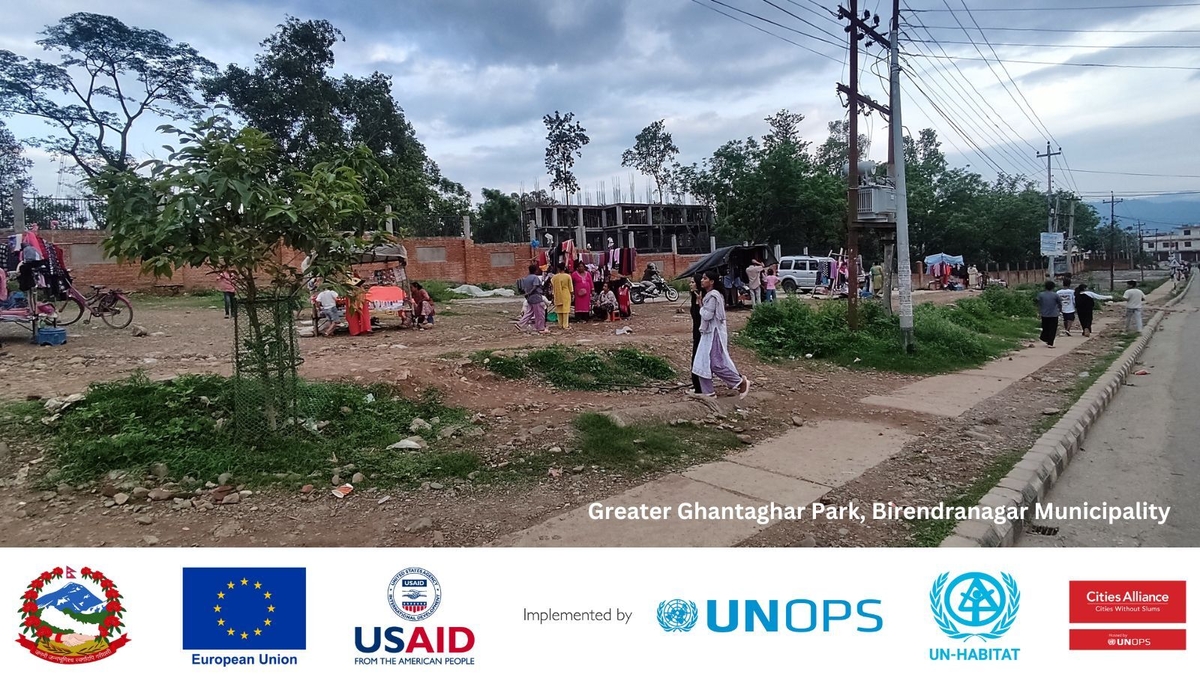
The project supported the Regional and Urban Planners’ Society of Nepal (RUPSON) to organise the National Planner’s Congress in June 2024 in collaboration with the Ministry of Urban Development and the Department of Architecture, Tribhuvan University Institute of Engineering, Pulchowk Campus.
Centred around the theme Local Actions for Sustainable Cities and Communities, the congress highlighted the need for local actions and initiatives to address prevalent global challenges impacting people’s daily lives in cities. Scholars and practitioners engaged in collective discourse on regional and urban issues, enriching understanding of the current status, challenges, initiatives, and future directions among policy makers and programme implementers.

To generate and disseminate knowledge on inclusive and climate-sensitive urban initiatives – especially the design and development of public open spaces – the Cities 4 Women project is providing grants for students to present their research at national or international conferences.
The competitive process is open to all master’s and PhD students conducting research on public open spaces from a variety of perspectives, including architecture, urban planning, urban design, gender equality, women’s participation, disability inclusion, disaster risk, climate adaptation, safety, transportation, public health, and public art.
The grant of a maximum of USD 650 per applicant, for a total of 24 applicants, will be awarded on a competitive basis to support the students for in-person or online participation and presentation at national or international conferences. Applications will be reviewed by a scientific jury for quality and relevance to the project. Priority will be given to women, particularly from marginalised and disadvantaged communities, sexual and gender minorities, and persons with disabilities, who are not able to access other funding.
All the papers presented at conferences with the support of this Conference Participation Grant will be collected in a publication and disseminated internationally.

